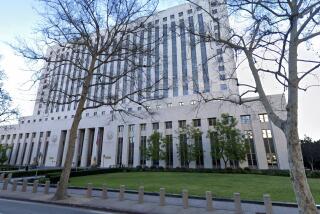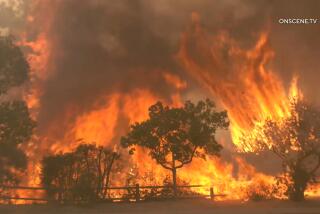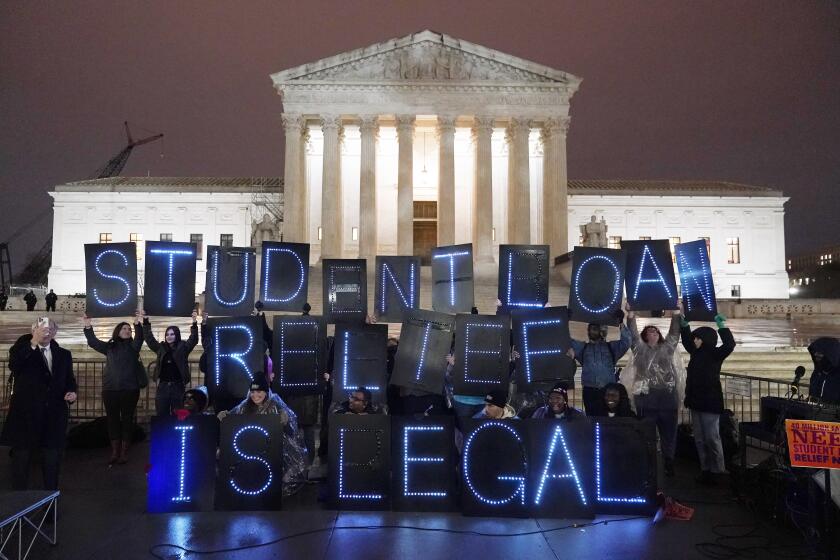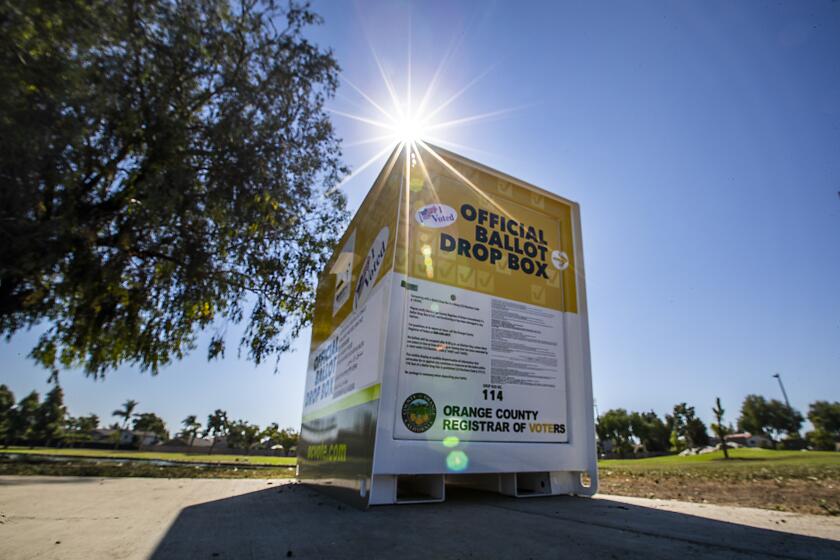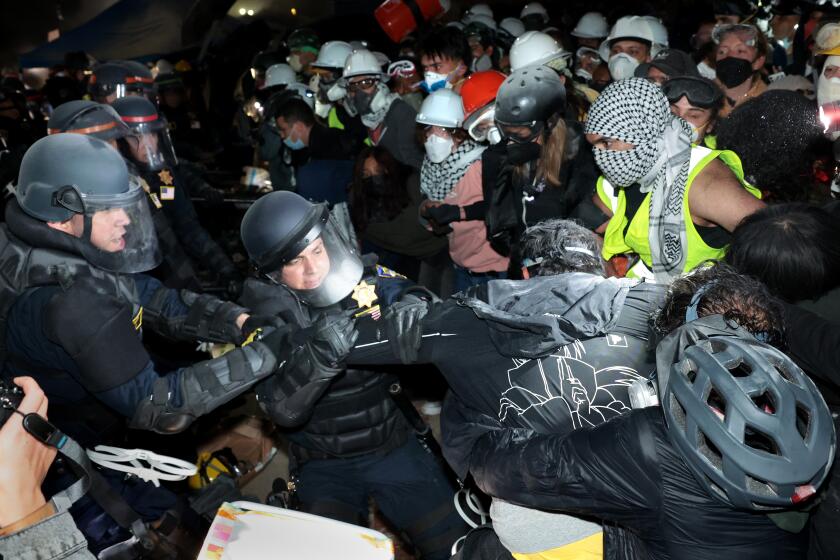Shake-Up at Nuclear Facility
The University of California announced sweeping changes Thursday in the leadership of Los Alamos National Laboratory, including the replacement of veteran Director John C. Browne, amid several federal investigations into allegations of widespread theft and corruption at the nuclear weapons facility.
Energy Secretary Spencer Abraham said he welcomed the steps announced by the university, but he also indicated that the department is questioning UC’s ability to run Los Alamos, saying the latest problems may be evidence of a “systemic management failure” at the New Mexico lab.
“It is crucial that we restore public confidence in the management of the laboratory,” Abraham said in a statement.
The University of California has managed Los Alamos for the federal government since 1943, when scientists and engineers led by Robert Oppenheimer developed and built the first atomic bombs.
The university is also under contract to the department to run two other national laboratories, Lawrence Livermore near Oakland, also a nuclear weapons facility; and Lawrence Berkeley, an energy research center near the UC Berkeley campus.
University officials said Browne, a physicist who became director of Los Alamos in 1997, and Joseph Salgado, the lab’s principal deputy director, will step down from their positions Monday. Browne will stay on at Los Alamos as a senior researcher; Salgado will leave the laboratory.
UC President Richard C. Atkinson appointed George P. “Pete” Nanos, a retired Navy vice admiral who now is a senior official in the Los Alamos facility’s threat reduction program, as the lab’s interim director while the university conducts a nationwide search for a permanent director.
The resignations at Los Alamos came amid mounting concern at the Energy Department, in congressional committees and elsewhere in recent months over allegations of credit card abuse, equipment theft and other problems at the weapons lab.
In November, two former police officers who had been hired by the lab to investigate the allegations were fired and later went public with claims that their dismissals were part of an attempt by Los Alamos officials to cover up alleged wrongdoing.
Investigations into the various allegations are now underway by the FBI, the Energy Department’s inspector general, the university and at least two congressional committees, according to university and Energy Department sources.
In recent years, the reputation of Los Alamos has been tarnished by a series of security breakdowns, including the disappearance in June 2000 of classified computer hard drives that later were found stashed behind a copy machine, and the December 1999 indictment of Wen Ho Lee, a former lab scientist who was accused of leaking nuclear secrets to China. Lee eventually pleaded guilty to a single count of mishandling nuclear data, in removing it from the laboratory, and prosecutors dismissed 58 other counts against him.
In the latest actions, university officials said Browne submitted his resignation Dec. 23, after meetings with Abraham and UC officials.
In a statement Thursday, Browne said “only a change in leadership will restore the confidence that is needed for [Los Alamos] to carry out its difficult and important mission.”
UC officials called the resignation a “mutual decision” but said it had become evident to Browne in recent months that the problems at Los Alamos were diverting attention from the lab’s scientific work and tarnishing his own reputation. Browne has worked in various capacities at the lab since 1979.
In announcing the shake-up Thursday, Atkinson said the university was making other changes, including the appointment of an oversight committee to help guide the interim director, and new requirements that the lab’s senior administrators, business managers and auditor report directly to the UC president’s office.
The actions “reflect the university’s deep concern about the allegations that have been made about Los Alamos business practices and our absolute and steadfast commitment to addressing them in a timely manner,” Atkinson said.
However, while praising the efforts made by the university to date, Energy Department officials made it clear that they do not think the lab’s problems are resolved.
Abraham, who has closely monitored the situation in recent weeks, said he has ordered the department to complete an evaluation of the university’s management of Los Alamos by April 30, or as soon as possible after the completion of a separate comprehensive investigation at the lab by the department’s inspector general.
The university’s contract to manage Los Alamos runs through September 2005, but it can be terminated by either party at any time, UC spokesman Michael Reese said. Under the contract, the university receives about $9 million a year to run Los Alamos, which employs about 7,500 people. The contract was signed two years ago, in the final days of the Clinton administration, amid worries at the university that the incoming Bush administration might award the prestigious contract to a private defense firm.
In a Dec. 24 letter to Atkinson, which was released Thursday, the Energy secretary said his department was “deeply concerned” about the allegations of theft and fraud at Los Alamos, including the alleged misuse of laboratory credit cards and theft through purchase orders.
Of more immediate concern, Abraham said in the letter, were the events surrounding the two investigators, Glenn A. Walp and Steven Doran, who were recruited by the laboratory and then dismissed Nov. 25 and escorted from the premises by armed guards after they made their claims about the alleged thefts and fraud at the lab.
“The inescapable conclusion is that the actions relating to Mr. Walp and Mr. Doran reflect a systemic management failure, one for which the laboratory management must be held accountable,” Abraham said.
The fired investigators, whose claims sparked outcries in Congress and conspiracy charges from the public, said they had uncovered evidence that an estimated $3 million in equipment had been stolen since 1999, including more than 260 computers -- some of them from the most sensitive areas of the lab, where nuclear weapons are designed.
On Thursday, Reese said that in addition to the management changes and other actions, the university has requested a meeting with Walp and Doran to learn of their concerns firsthand. UC has also hired Charles LaBella, a former Justice Department prosecutor, to act as a liaison with federal investigators.
“We too have had questions that have not been answered [by Los Alamos officials], but we have had a 60-year history of effectively managing those labs, and that ought to be taken into consideration,” Reese said. “We recognize that there’s a serious problem here, but the efforts we’re making are unprecedented.”
In Washington on Thursday, a watchdog group that has monitored the problems at Los Alamos applauded the university’s actions, while urging the Department of Energy to take a stern look at UC’s role at the weapons lab.
“There was a culture there that allowed these problems to happen,” said Danielle Brian, executive director of the Project on Government Oversight, a group that monitors waste and fraud in the federal government. “It was not exclusively the fault of these two men [Browne and Salgado], and that’s not the only thing that needs to change.”
More to Read
Sign up for Essential California
The most important California stories and recommendations in your inbox every morning.
You may occasionally receive promotional content from the Los Angeles Times.
